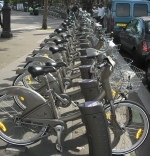 (HOST) While in Paris last summer, commentator Mike Martin observed a bike share program in which participants burn calories instead of gasoline.
(HOST) While in Paris last summer, commentator Mike Martin observed a bike share program in which participants burn calories instead of gasoline.
(MARTIN) Even though it’s autumn in Burlington where I live, you can see plenty of bikers trying to get in a few more rides before the wind grows colder. There are serious riders in tight jerseys with lots of lettering, retired couples who seem to pedal in sync, kids rolling low on their bmx trick bikes, and brave parents pulling toddler trailers hitched on the back. But while it’s obvious that people in Burlington love biking, most of us still jump in the car to run errands or make quick trips across town.
Well, this is not the case in Paris. Since July 2007, more and more Parisians have chosen the bicycle over the automobile thanks to a new program called Vélib’. Vélib’, which gets its name from combining the French words for "bike" and "free," is a city-sponsored program that provides over 20,000 bicycles at hundreds of stations throughout the city for a small user fee. To use a bike, subscribers simply walk to the closest station, check one out electronically, and drop it off at the station closest to their destination. The stations are around 300 meters apart and are open 24 hours a day. The City of Paris maintains the bikes, and since they’re all parked at street level, they don’t have to be stored in apartments or hauled up and down flights of stairs either. And they’re nice bikes too: each comes with disc brakes, a wire basket, and front and rear lights.

Of course there have been a few problems with Vélib’: the cost of repairing vandalized bikes was higher than expected, and there have been six fatal traffic accidents out of the nearly 25 million rentals these past two years. But the City of Paris has responded with a public safety campaign which has actually reduced the number of bike-related traffic accidents. It would appear that even Parisian drivers are learning to change their notoriously aggressive driving habits to share the road with the thousands of cyclists who use the city’s extensive bike lanes.
The Vélib’ bike-share program has now spread to many cities, not only in France, but elsewhere in Europe and even in North America. Visitors to Montreal will notice bike-share parks for its Bixi program – the word is a combination of "bike" and "taxi". And after a visit to Paris, San Francisco Mayor Gavin Newsom announced that his city would launch a small bike-share program this year.
Even on a small scale, these programs represent a new way of thinking. In the years to come, we can expect to see more successes – and challenges – for programs like these as city-dwellers choose to burn calories instead of gasoline to get around town.
So maybe bike-share programs could work even in little cities like my own. In Burlington the other day, my son crossed town faster than I did – he took the bike path and got some fresh air while I sat in my car waiting for the lights to change.